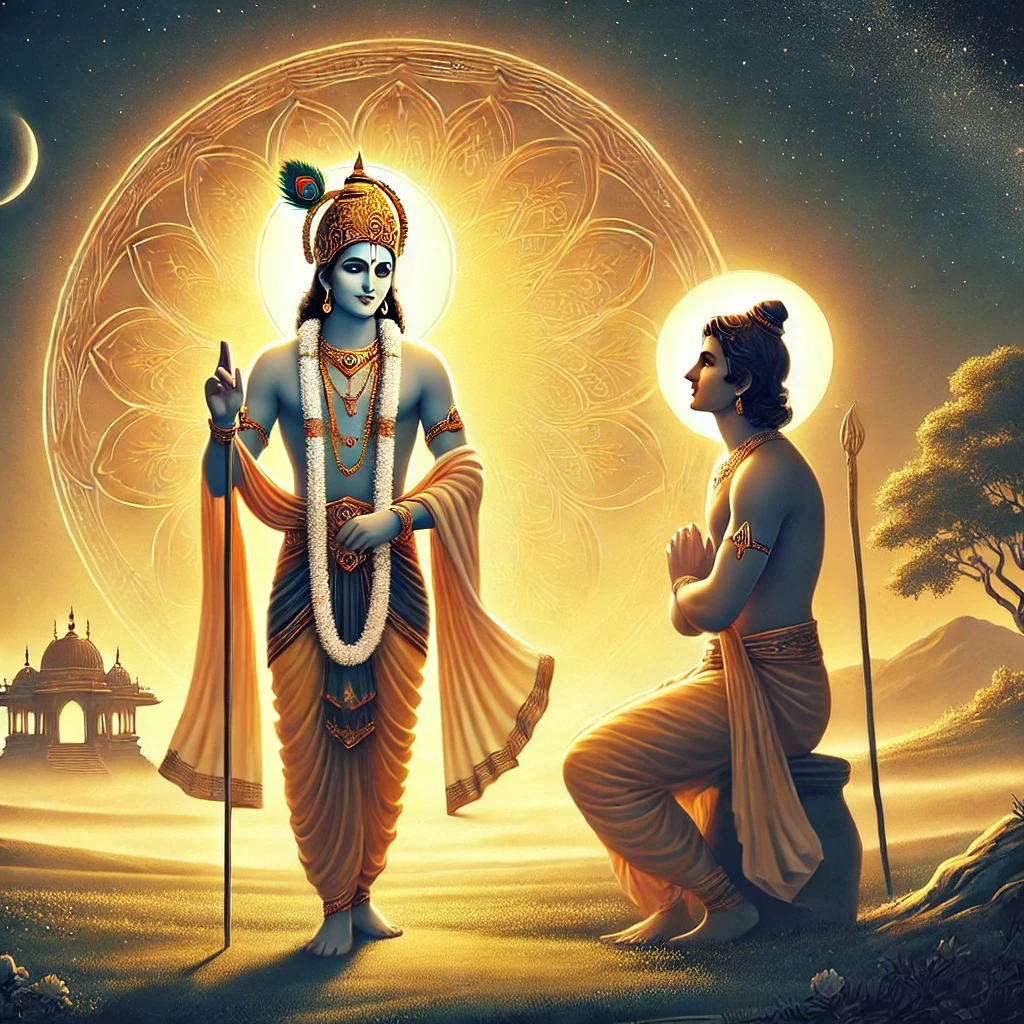श्रीभगवानुवाच
इमं विवस्वते योगं प्रोक्तवानहमव्ययम् ।
विवस्वान्मनवे प्राह मनुरिक्ष्वाकवेऽब्रवीत् ॥ १ ॥
Chapter’s Name: Gyaan-Karm-Sanyaas-Yoga
Here the word ‘Gyaan’ denotes Paramartha-Gyaan i.e. Spiritual knowledge, the word ‘Karm’ denotes Karmayoga i.e. path of Yoga and the word ‘Sanyaas’ denotes Sankyayoga i.e. path of knowledge. Intellectual and Scriptural knowledge is also included under the word ‘Gyaan’.
In this fourth chapter, God has described the secret of his incarnation and the Karmayoga and Sanyasa-yoga along with the elements and the true knowledge of the essence of God which is the result of all this.
Therefore this chapter has been named ‘Gyan-Karma-Sanyas-Yoga‘.
Transcendental Wisdom: The Divine Science of Karma Yoga
There are two ways to dissolve all the karma and to be free from the bondage – to know the essence of karma and to attain the knowledge of the truth.
God creates the universe but does not bind us as there is no pride in doing that karma and no attachment to its fruit. Those who do not have any attachment, desire, affection, etc. for the fruit of karma, i.e., remain completely detached from the fruit of karma and perform karma while remaining detached, destroy all the bondage.
A person whose entire karma is free from thoughts and desires is burnt. He who does not have any attachment to karma and its fruit is not bound by karma even while being fully involved in karma. He who performs karma only for the sustenance of the body and who remains the same in the success and failure of karma is not bound even after performing karma. He who performs karma only to protect the tradition of duty, his entire karma is absorbed. In this way, by knowing the essence of karma properly, man becomes free from their bondage.
To completely sever ties with inertia is the Tattva-gyaan (Absolute Knowledge). This Tattva-gyaan is superior to the yagyas performed with material things. In this Tattva-gyaan, all the karma comes to an end. On attaining Tattva-gyaan, there is no attachment ever again. Even the most sinful man can overcome all sins with knowledge. Just as fire burns all fuel, similarly the fire of knowledge reduces all karma bondage to ashes.
Bhagavad Gita Chapter 4 Summary Verse Wise
Verses 1-2: The disciplic succession of Karmayoga is described.
Verse 3: This knowledge is praised.
Verse 4: Arjuna asks the Lord about his birth-related question.
Verse 5: Lord has spoken about his and Arjuna’s many births and said that I know all of them and you do not know.
Verses 6-8: He describes the essence, mystery, time, and reasons for his incarnation.
Verses 9-10: The result of knowing the Lord’s birth and deeds as divine and being dependent on him leads to the attainment of God.

Verse 11: The Lord has told that he worships the person in the same way that the person worships him.
Verse 12: It is described that the worldly results of worshipping other gods are attained soon.
Verses 13-14: The Lord has told us to consider himself as the non-doer even though he is the doer of the whole world and has told us about the divinity of his deeds and the result of knowing them is not being bound by karma.
Verse 15: Arjun is told to understand by giving the example of the seekers of salvation in the past and commanded to perform work without any selfish motive.
Verses 16-18: By vowing to reveal the secret of karmas, Krishna has praised those who see akarma in karma and karma in akarma. He declared the essence of karma is hard and essential to know.
Verses 24-30: By describing yagyas like brahmayagya, material yagya, and non-dualistic vision yagya, all yagya performers have been declared as yagya experts and sinless.
Verse 31: It has been said that those who experience the nectar left after these yagyas will attain the eternal Brahma and those who do not perform yagya will not get happiness in both worlds.
Verse 32: It has been said that all the above-mentioned types of yagyas can be performed through kriya.
Verse 33: In this, knowledge-yagya has been declared better than material-based yagya.
Verses 34-35: Arjun is told to go to wise saints and learn the Absolute Truth and has praised it.
Verse 36: It is told that one can cross the ocean of sins by the boat of knowledge.
Verse 37: Gyaanyoga is told to be like fire which burns the karma.
Verse 38: While describing the great purity of knowledge, it is said that the karma yogi with a pure heart gets the knowledge automatically.
Verse 39: A person endowed with qualities like faith etc. is told to be entitled to acquire knowledge and the fruit of knowledge is said to be supreme peace.
Verse 40: The ignorant and faithless doubtful person is condemned.
Verse 41: It is said that a doubt-free karma yogi is freed from the bondage of karma.
Verse 42: He concludes this chapter by inspiring Arjun to fight the war by destroying the doubts born out of ignorance through knowledge and ordering him to remain engrossed in Karmayoga.
तस्मादज्ञानसम्भूतं हृत्स्थं ज्ञानासिनात्मनः ।
छित्त्वैनं संशयं योगमातिष्ठोत्तिष्ठ भारत ॥ ४२ ॥
Read Bhagavad Gita Chapter 4 Online on Vedabase
With over three years of dedicated experience in studying and researching Indian scriptures, the author is passionate about sharing the profound wisdom of texts like the Bhagavad Gita, Puranas, and Upanishads. Through in-depth exploration of authentic commentaries, such as those by Gita Press, combined with thoughtful online research, the insights provided are both accurate and engaging.



